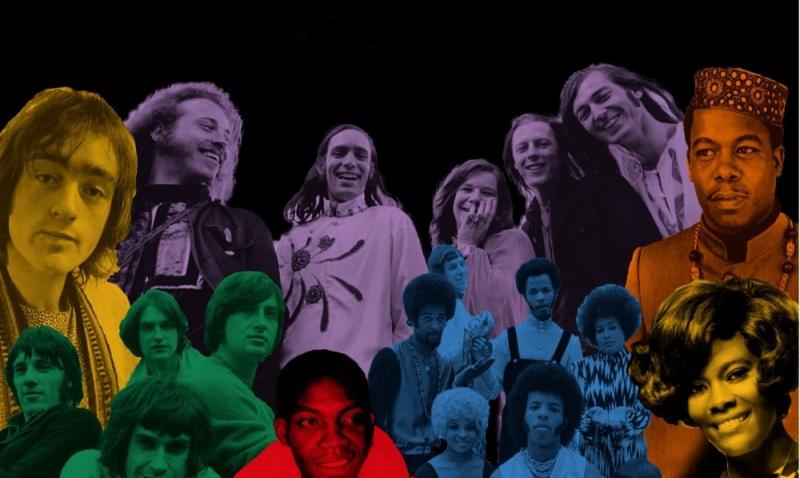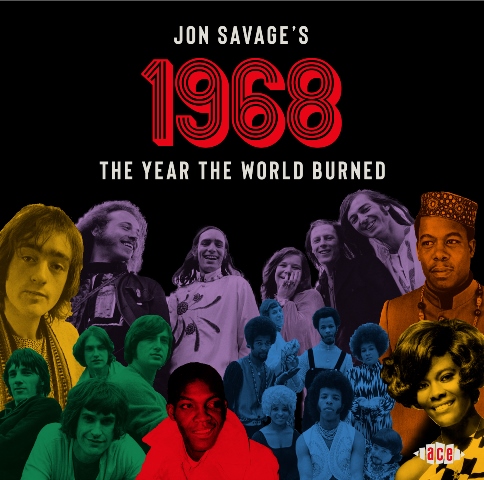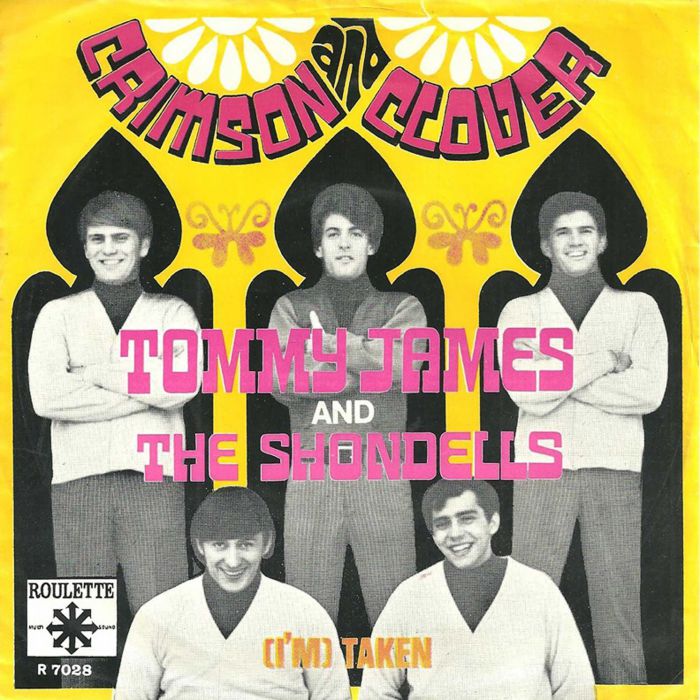Reissue CDs Weekly: Jon Savage's 1968 | reviews, news & interviews
Reissue CDs Weekly: Jon Savage's 1968
Reissue CDs Weekly: Jon Savage's 1968
‘The Year the World Burned’ captured in 48 tracks

Without the necessary distance, characterising last year through its pop music is a mug’s game. A gulf of 50 years would bring some perspective. Nonetheless, in spite of that interval there are difficulties in creating a fitting soundtrack to 1968 – especially when using its singles as the emblematic markers.
The difference between pop and rock had been codified in 1968, and the album was the chosen means of expression for many musicians. Even so, regardless of the emergence of underground or album-format shows and stations, song-centric pop radio was still the means to reach a wider audience. Record labels wanted their freakiest, hairiest, jammiest bands to condense their spirit onto the two sides of a single.
 On Jon Savage’s 1968 – The Year the World Burned, this is rammed home by the inclusion of Quicksilver Messenger Service’s “Dino's Song”. A jammy band, certainly, although borderline freaky and not so facially hairy. Extracted from their first album, it works well as a melodic and rhythmic yet low-key single. But what if it had been a fluke hit? The new audience they might have attracted may have been perplexed by their half-hour on-stage extemporisations.
On Jon Savage’s 1968 – The Year the World Burned, this is rammed home by the inclusion of Quicksilver Messenger Service’s “Dino's Song”. A jammy band, certainly, although borderline freaky and not so facially hairy. Extracted from their first album, it works well as a melodic and rhythmic yet low-key single. But what if it had been a fluke hit? The new audience they might have attracted may have been perplexed by their half-hour on-stage extemporisations.
Then there’s proto-space rockers Lothar and the Hand People’s “Machines”, a single drawn from their debut album. The Mort Shuman song was first recorded by Manfred Mann but Lothar etc. ramped up the herky-jerkiness, added synthesisers and a Theremin, and turned it into a template for Devo. Another flop.
Of course, The Year the World Burned also seeks to typify the wider world as such but the events and upheavals of 1968 are well chronicled, and require no reiteration here. Anyway, the records say enough. Disc Two of this 48-track double set kicks off with The Crazy World of Arthur Brown’s “Fire!”, a record in-tune with the times even if it is not explicitly such. James Brown’s “Say it Loud! - I'm Black and I'm Proud (Pt. 1)” is unambiguous though.
Gratifyingly, pop is well represented and integral to the flow. The 5th Dimension’s “Carpet Man” (weird masochism-alluding lyrics and all) and Tommy James and the Shondells’ majestically frazzled “Crimson and Clover” are amongst the gems. So are conscious soul-pop records such as Four Tops’ “I'm In A Different World”, Martha Reeves and the Vandellas’ “Honey Chile” and The Temptations’ “Cloud Nine”.
 Amongst the idiosyncratic inclusions are singles by bands which stretched out over albums and sought to compress this onto one side of a seven-inch (unlike QMS’s “Dino’s Song”, which was pretty straight folk-pop). The Pretty Things’ “Talkin’ About the Good Times” – successfully – crams the changes of a whole album into a few minutes. So does Love’s disturbing, fragmented non-album single “Your Mind and We Belong Together”. In contrast, the collection’s single-minded final track is an extraordinary, alternate version of The MC5’s “Kick Out the Jams” from a 500-copy promotional single given away at a New York show on 26 December 1968. Some of the audience – members of which stormed the stage and trashed the band’s equipment – threw the record at the band.
Amongst the idiosyncratic inclusions are singles by bands which stretched out over albums and sought to compress this onto one side of a seven-inch (unlike QMS’s “Dino’s Song”, which was pretty straight folk-pop). The Pretty Things’ “Talkin’ About the Good Times” – successfully – crams the changes of a whole album into a few minutes. So does Love’s disturbing, fragmented non-album single “Your Mind and We Belong Together”. In contrast, the collection’s single-minded final track is an extraordinary, alternate version of The MC5’s “Kick Out the Jams” from a 500-copy promotional single given away at a New York show on 26 December 1968. Some of the audience – members of which stormed the stage and trashed the band’s equipment – threw the record at the band.
The Year the World Burned follows on from Jon Savage’s similarly packaged compilations dedicated to 1965, 1966 and 1967, all springing off from his book 1966 – The Year the Decade Exploded. Unless he tracks back to 1964, it is unlikely that the series can continue as the usefulness of singles as a cultural barometer had decreased as the Sixties came to a close. When they were issued in mono on single, all tracks on The Year the World Burned rightly appear thus and the well-designed Savage-annotated booklet is a joy. With the exception of Desmond Dekker and the Aces’ “Israelites”, the focus is limited to America and Britain. The Beatles and The Rolling Stones do not appear as their tracks are not licensable.
A spin-off implication of this release derives from its arrival on CD. It would be impossible to programme and sequence anything similar on vinyl. A six-or eight-sided album set would be terrifically expensive, unwieldy and lack any flow. Those wedded to the idea of the CD as a dead medium should look here and ponder their position.
- Next week: Music is the Most Beautiful Language in the World – a salute to the Jewish music of London’s East End
- Read more reissue reviews on theartsdesk
Share this article
The future of Arts Journalism
You can stop theartsdesk.com closing!
We urgently need financing to survive. Our fundraising drive has thus far raised £49,000 but we need to reach £100,000 or we will be forced to close. Please contribute here: https://gofund.me/c3f6033d
And if you can forward this information to anyone who might assist, we’d be grateful.

Subscribe to theartsdesk.com
Thank you for continuing to read our work on theartsdesk.com. For unlimited access to every article in its entirety, including our archive of more than 15,000 pieces, we're asking for £5 per month or £40 per year. We feel it's a very good deal, and hope you do too.
To take a subscription now simply click here.
And if you're looking for that extra gift for a friend or family member, why not treat them to a theartsdesk.com gift subscription?
more New music
 Brìghde Chaimbeul, Round Chapel review - enchantment in East London
Inscrutable purveyor of experimental Celtic music summons creepiness and intensity
Brìghde Chaimbeul, Round Chapel review - enchantment in East London
Inscrutable purveyor of experimental Celtic music summons creepiness and intensity
 First Person: Musician ALA.NI on how thoughts of empire and reparation influenced a song
She usually sings about affairs of the heart - 'TIEF' is different, explains the star
First Person: Musician ALA.NI on how thoughts of empire and reparation influenced a song
She usually sings about affairs of the heart - 'TIEF' is different, explains the star
 Album: The Divine Comedy - Rainy Sunday Afternoon
Neil Hannon takes stock, and the result will certainly keep his existing crowd happy
Album: The Divine Comedy - Rainy Sunday Afternoon
Neil Hannon takes stock, and the result will certainly keep his existing crowd happy
 Music Reissues Weekly: Robyn - Robyn 20th-Anniversary Edition
Landmark Swedish pop album hits shops one more time
Music Reissues Weekly: Robyn - Robyn 20th-Anniversary Edition
Landmark Swedish pop album hits shops one more time
 Album: Twenty One Pilots - Breach
Ohio mainstream superstar duo wrap up their 10 year narrative
Album: Twenty One Pilots - Breach
Ohio mainstream superstar duo wrap up their 10 year narrative
 Album: Ed Sheeran - Play
A mound of ear displeasure to add to the global superstar's already gigantic stockpile
Album: Ed Sheeran - Play
A mound of ear displeasure to add to the global superstar's already gigantic stockpile
 Album: Motion City Soundtrack - The Same Old Wasted Wonderful World
A solid return for the emo veterans
Album: Motion City Soundtrack - The Same Old Wasted Wonderful World
A solid return for the emo veterans
 Album: Baxter Dury - Allbarone
The don diversifies into disco
Album: Baxter Dury - Allbarone
The don diversifies into disco
 Album: Yasmine Hamdan - I Remember I Forget بنسى وبتذكر
Paris-based Lebanese electronica stylist reacts to current-day world affairs
Album: Yasmine Hamdan - I Remember I Forget بنسى وبتذكر
Paris-based Lebanese electronica stylist reacts to current-day world affairs
 theartsdesk on Vinyl 92: Marianne Faithful, Crayola Lectern, UK Subs, Black Lips, Stax, Dennis Bovell and more
The biggest, best record reviews in the known universe
theartsdesk on Vinyl 92: Marianne Faithful, Crayola Lectern, UK Subs, Black Lips, Stax, Dennis Bovell and more
The biggest, best record reviews in the known universe
 Blondshell, Queen Margaret Union, Glasgow review - woozy rock with an air of nonchalance
The singer's set dripped with cool, if not always individuality
Blondshell, Queen Margaret Union, Glasgow review - woozy rock with an air of nonchalance
The singer's set dripped with cool, if not always individuality

Add comment